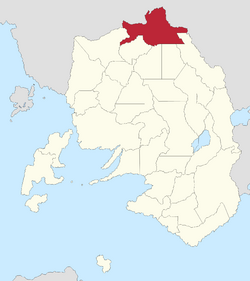Ænglasmarch
This article is a work-in-progress because it is incomplete and pending further input from an author. Note: The contents of this article are not considered canonical and may be inaccurate. Please comment on this article's talk page to share your input, comments and questions. |
Script error: The module returned a nil value. It is supposed to return an export table.
State of Ænglasmarch | |
|---|---|
 Location of the State of Ænglasmarch | |
| Country | Urcea |
| Cathedral City | Holchester |
| Government | |
| • Secretary-General | Arnold Ædwardson (S) |
| Population (2030) | |
| • Total | 11,191,580 |
The State of Ænglasmarch is one of two states of the Apostolic Kingdom of Urcea. During the Nordmontaine War, the Kingdom of Angla was dissolved and, following the Great Confessional War, Urcea assumed ownership over Duchy of Holchester. The duchy continued to largely attend to their own affairs and were awarded a degree of autonomy. In 1895, most of the Duchy was reorganized as the State of Ænglasmarch along with Gassavelia as a result of the Administrative Reorganization Act of 1892.
It is Urcea's fourth largest subdivision by area, trailing Urceopolis, Gassavelia, and Harren.
History
The State of Ænglasmarch originated as a core part of the Ænglish realm which existed in central Levantia from the 11th to 16th centuries, with its modern territory encompassing the realm's capital of Holchester and important political and economic centers of the realm. This realm, originally a march of the Holy Levantine Empire, grew prosperous through tribute and control of trade allowed by the Anglasweorc. The establishment of Yonderre and Christianization of Gothica led to a decline in the fortunes of the realm, exacerbating religious disunity and other domestic unrest as part of The Anarchy. In the midst of the Protestant Reformation, the realm became Protestant, creating the the Ænglish Church. The newly Protestant Kingdom was subsequently destroyed during the Nordmontaine War by the Emperor of the Levantines, and the Kingdom was dissolved into its constituent parts. The biggest "prize" was the Duchy of Holchester, the core part of the former realm, which the Emperor gave to House de Weluta which had recently lost power in Urcea. The area of Holchester was devastated by the Nordmontaine War which followed a century of economic decline.
Duchy of Holchester
Aedanicus de Weluta, the often sickly and possibly developmentally disabled brother of King Adrian III (1492-1546) was given the Duchy of Holchester by Emperor Conchobar III as compensation for loss of the Julian throne in 1554. Aedanicus attempted to use the Duchy as a base of power to reclaim the throne but was killed following a raid on Castle Welute in 1560. His son, Leo de Weluta, succeeded him as Duke of Holchester. Leo also used Holchester as a base of power but was far more deliberate, using troops from the Duchy to take key strategic cities throughout eastern Urcea while raising Ionians to his banner. Leo's reign in Holchester, meanwhile, had many positives and negatives. Following his restoration as Apostolic King in 1565, Leo showered the city of Holchester with significant prizes and built a small triumphal arch there in their honor in 1567. Leo significantly invested in the city, and he generously rewarded Ænglish nobles and soldiers that supported him, and the economy of the Duchy had improved significantly by 1575 compared to 1554. On the reverse, once the war was over, Leo launched thorough campaigns of religious deportations and persecutions, establishing societies for relocations of those Ænglish believer who refused to convert. The Dragonnades were prosecuted vigorously in the Duchy, leading to significant demographic devastation as many were killed or their property destroyed. By 1600, nearly all Protestants were gone from the Duchy, having converted to Catholicism, sent abroad to Pharisedoms, or having been killed. The Duchy's economy would not return to 1575 levels until 1630.
The Duchy was neglected by the Urcean Kings until about 1640, when significant investment into new Churches and artwork led to an influx of artists to Holchester, creating the Ænglish Baroque period. Trade with Yonderre and former Ænglish possessions, especially Hollona, made the Duchy relevant once again in the Levantine trade network. The Duchy remained a special focus project for its de Weluta Dukes for the remainder of the 17th century. As their focus turned to ruling the Holy Levantine Empire, however, the Duchy would once again become the subject of neglect for the next forty years beginning in 1700.
State of Ænglasmarch
Geography
| This article is part of a series on the |
| Geography of Urcea |
|---|
 |
Cities and towns
Economy
Demographics
Culture
Government
Politics
Sports
